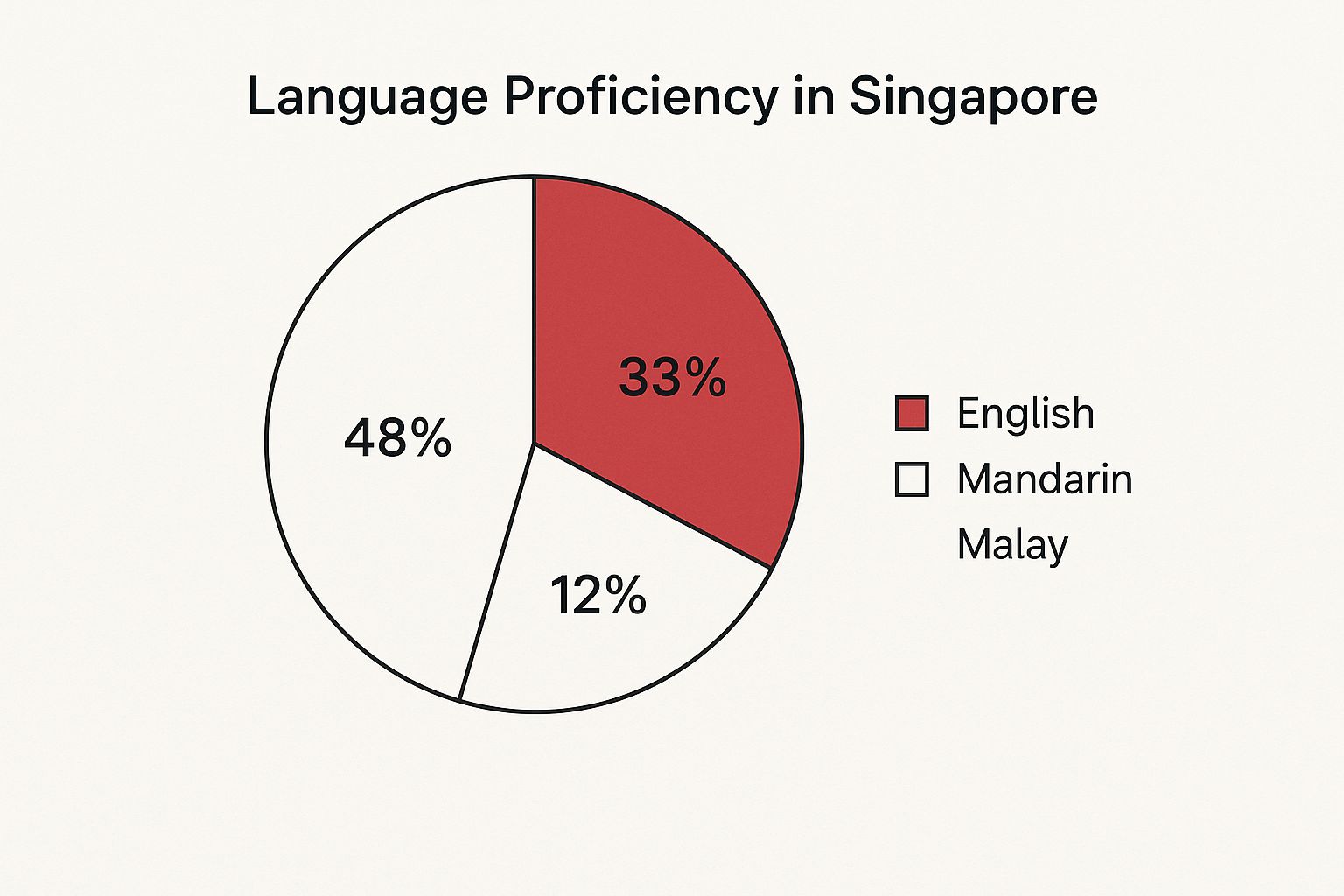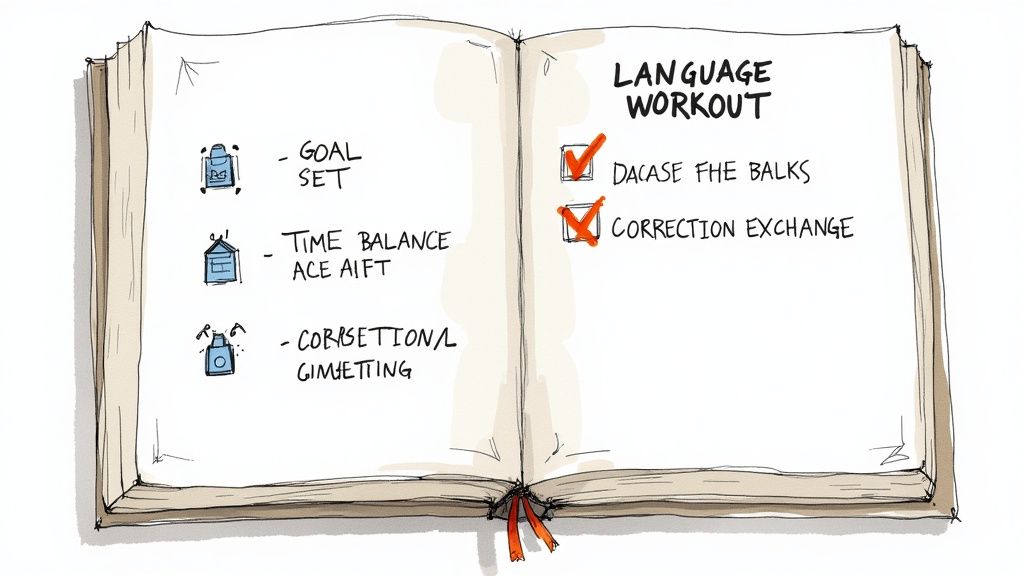Language Exchange Singapore: Your Ultimate Guide to Connecting
A language exchange in Singapore isn't just another hobby—it's your fast track to real cultural immersion. Think of it as teaming up with a native speaker to practise a language like Mandarin, Malay, or Tamil in the wild, not just in a classroom. It’s an incredibly effective and engaging way to really get fluent.
Why Singapore Is a Perfect Hub for Language Practice
Picture this: your morning commute or your daily coffee run doubles as a spontaneous language lesson. That's not a fantasy; that’s just life in Singapore. The city's unique cultural tapestry makes it the perfect playground for anyone serious about mastering a new language. Here, learning isn't locked away in a school—it's part of the everyday chatter and social rhythm.
This incredible opportunity is rooted in Singapore's multilingual DNA. The country officially recognises four languages: English, Malay, Mandarin, and Tamil. This cornerstone supports the nation's bilingual education policy, where every student learns English and their mother tongue. The result is a society naturally primed for language exchange, from schools to hawker centres.
Add to that the more than 1.6 million non-resident foreigners from all over Asia and the world, and you’ve got a buzzing hub of languages and cultures.
The Melting Pot Advantage
Singapore’s reputation as a cultural melting pot is its biggest secret weapon for language learners. In a monolingual country, finding someone to practise with can feel like a real mission. Here, opportunities are literally everywhere.
You could order your kopi in Malay, talk business with a client in Mandarin, and then catch up with friends in English—all before lunch. This is what makes a language exchange in Singapore so powerful. You're not just drilling flashcards; you're living the language. You start picking up on slang, tone, and cultural cues that no textbook could ever teach you. It’s the difference between just knowing the words for "thank you" and truly understanding the politeness behind the phrase.
This infographic paints a perfect picture of how a simple chat in a Singaporean café can blend multiple languages and cultures together.
The image captures that effortless code-switching that defines daily life here, turning the entire city into a living language lab.
Beyond Asia: A Global Language Hub
While the official languages form a solid base, Singapore's role as a global business and travel destination means you’ll find native speakers from just about anywhere. Looking to practise your French, German, or Japanese? Odds are, there's a community or a language partner here waiting for you.
This extends to languages like Spanish, too. As the world gets more connected, more people are keen to pick up Romance languages. If that sounds like you, you might want to check out our guide that tackles the common question, "is Spanish easy to learn?" for English speakers.
The real magic happens in the small, everyday interactions—chatting with a shopkeeper, asking for directions, or sharing a meal. These moments build confidence and create a much deeper connection to both the language and the local culture.
Ultimately, a language exchange in Singapore is about so much more than just becoming fluent. It’s your ticket to understanding new perspectives, making genuine friends, and truly becoming part of the vibrant, multicultural mosaic that is Singapore.
Finding Your Partner on Digital Language Platforms
Living in a place as connected as Singapore means your perfect language partner could be just a few taps away on your phone. Digital platforms have totally changed the game, giving you the freedom to practise whenever and wherever you want. This shift online has made connecting with native speakers easier and more convenient than ever before.
Forget the old days when your search was limited to who you could physically meet. Today's tools—from video calls to instant messaging and even AI-powered feedback—can seriously fast-track your learning. You could be chatting with someone across town on your lunch break or practising your Spanish with a native speaker in Madrid right before bed.
It’s no surprise this digital approach has really taken off in Singapore. Online language exchanges are now a crucial part of the learning toolkit, helping people sharpen their real-world conversation skills and pick up on those subtle cultural nuances you just can't get from a textbook. In fact, studies show that students taking part in online exchanges can see a 50% improvement in language proficiency compared to those who only study on their own.
Top Online Language Exchange Platforms for Learners in Singapore
With so many apps and websites out there, figuring out where to start can feel a bit much. Each platform offers a unique vibe, so the best fit really comes down to your learning style and what you’re hoping to achieve. Some feel like social media networks for language nerds, while others are more like structured tutoring platforms.
To help you cut through the noise, we've put together a quick comparison of some of the most popular options available to learners in Singapore.
| Platform | Best For | Key Features | Cost Structure |
|---|---|---|---|
| Tandem | Mutual learning with serious partners. | Profile matching, in-app corrections, video/audio calls, scheduled lessons with tutors. | Freemium (core features free, Pro subscription for advanced filters and unlimited translations). |
| HelloTalk | Casual, social practice and community engagement. | Text/voice/video chat, group chats, translation tools, "Moments" feed (like a social timeline). | Freemium (basic features free, VIP membership for more features). |
| italki | Structured lessons with professional teachers or community tutors. | 1-on-1 video lessons, pay-per-lesson model, instant tutoring, free community features. | Pay-per-lesson (prices set by tutors). Free to find language exchange partners. |
| Speaky | Quick and easy chats with partners online right now. | Live chat interface, filters by native language and interests, mobile and web versions. | Free with a premium option for an ad-free experience and unlimited translations. |
Ultimately, the best platform is the one you'll actually use consistently. My advice? Try out the free versions of two or three of these to see which community and interface feel most comfortable for you.
Choosing the Right Platform For You
Beyond the big names, there are a few distinct types of platforms you’ll come across. Understanding the differences will help you find your niche.
-
Tandem Learning Apps: These are purpose-built platforms like Tandem and HelloTalk. They match you with native speakers who are learning your language, creating a mutual give-and-take. Most come packed with helpful tools like in-app text corrections and translations.
-
Community-Based Forums: If you prefer a more DIY approach, sites like Reddit are goldmines. Subreddits such as r/language_exchange let you post exactly what you’re looking for and find partners for everything from simple text chats to regular video calls.
-
Voice Chat Servers: For those who want to jump straight into speaking, many language communities use voice chat services for live group conversations. While many flock to the big names, it's always smart to check out alternatives to Discord to discover a community that perfectly matches your vibe.
Staying Safe in the Digital Space
Online platforms open up a world of opportunity, but it’s crucial to be smart about your safety and online etiquette. Creating a positive, respectful space is key to making sure both you and your partner get what you need from the exchange.
A language exchange is a two-way street. You’re both there to learn and teach. The whole thing is built on patience, clear communication, and mutual respect.
Here are a few ground rules to keep your online interactions safe and productive from the get-go:
-
Guard Your Personal Info: Be careful about sharing sensitive details. There’s no need to give out your home address, financial info, or workplace. Keep your early conversations on the platform itself until you build trust.
-
Check Out Their Profile: Before reaching out, take a minute to review a potential partner’s profile. Look for a clear description of their goals, good reviews from others, and what seems like a genuine interest in learning.
-
Report Anything Sketchy: All good platforms have community guidelines and an easy way to report troublemakers. If anyone makes you feel uncomfortable, don’t hesitate to use the report and block features.
-
Set Clear Expectations: In your very first chat, talk about your goals. What do you want to achieve? Do you prefer texting or video calls? How often do you want to connect? Getting this sorted out early prevents a lot of headaches later.
Connecting in Person at Local Meetups and Events
While apps and websites are fantastic tools, there’s a certain magic that happens when you practise a new language face-to-face. In-person meetups take your learning off the screen and into the real world, letting you soak up all the subtle cues—body language, tone of voice, facial expressions—that give a conversation its true meaning.
If you’re serious about becoming fluent, taking your language exchange in Singapore offline isn't just a good idea; it's a game-changer.
Ready to dive in? The city is buzzing with opportunities. You could find yourself in a laid-back coffee chat in Tiong Bahru or a more organised gathering at a local community centre. These events are designed to be supportive and encouraging, creating the perfect space to build your confidence and make real friends with native speakers and fellow learners.
The trick is to find a group that clicks with your personality and what you want to achieve. Some meetups are big, boisterous affairs, while others are more intimate and focused. Don't be afraid to try a few different ones to see what feels right.
Finding Your Tribe Online and Offline
Ironically, the best way to find these real-world connections often starts with a quick online search. Platforms designed to bring people together are your best bet for discovering what’s happening across the island.
Here’s where to look:
- Meetup.com: This is the undisputed king of local group discovery. Just search for "language exchange," "Mandarin practice," or "English conversation," and you’ll find tons of active groups in Singapore. Many are free and hold regular sessions in public spots like libraries or cafés.
- Facebook Groups: Never underestimate the power of social media. Look up groups like "Language Exchange Singapore" or "Expats in Singapore." These communities often post about informal get-togethers and are a great place to ask for recommendations from people who are already in the scene.
- Eventbrite: While it's known more for ticketed events, Eventbrite is a goldmine for language workshops, cultural festivals, and social mixers. These can be brilliant opportunities to immerse yourself in a specific culture while flexing your language muscles.
- Community Centres and Libraries: Don't forget to check out what's happening right in your neighbourhood. Many community centres and public libraries host their own language clubs. Pop by and check their notice boards or visit their websites for the latest schedules.
Once you spot a promising group, take a moment to read the event descriptions and any past reviews. This will give you a feel for the group's vibe, how many people usually show up, and how it’s run, helping you pick a place where you'll feel comfortable from the get-go.
The Unmatched Value of Face-to-Face Practice
Meeting in person gives you things that a video call just can't. It’s not just about the words you say; it's about the entire experience of communication.
The real growth happens when you move beyond just vocabulary and grammar. It's in the shared laughter after a misunderstood joke, the encouraging nod from a new friend, and the small, everyday conversations that build true fluency and lasting connections.
When you're physically there with someone, you engage all your senses. You learn to read the room, pick up on humour, and interpret the non-verbal signals that make up a massive part of any conversation. Even a simple greeting can mean different things depending on someone's tone and posture.
You’ll also build the practical skills needed for daily life, like ordering kopi at a hawker centre or asking for directions at an MRT station. Nailing these small interactions is a huge confidence boost. For instance, if you're learning Spanish, knowing the social etiquette behind greetings is key. You can get a head start by learning the different ways to ask "how are you" in Spanish before you even walk in the door.
Preparing for Your First Meetup
It's completely normal to feel a bit nervous before your first event. Don't worry, a little preparation can make all the difference and help you have a great time.
Try thinking of a few easy conversation starters beforehand. You could chat about why you chose to learn the language, ask your partner about their hobbies, or talk about your favourite spots in Singapore. The point isn’t to have a perfect, mistake-free dialogue—it's just to connect and practise.
And remember, everyone else is in the same boat. They’re all there to learn and help each other out. So embrace the wobbles, be ready to make a few mistakes, and focus on the fun of meeting someone new. That positive mindset is the best tool you can bring.
How Language Skills Can Supercharge Your Career in Singapore
Sure, connecting with new people is a huge part of language exchange, but don't underestimate its power as a career move. Here in a global business hub like Singapore, getting good at another language isn't just a hobby—it's a smart investment in your professional life. Fluency can unlock doors you didn't even know were there.
Singapore's economy thrives on international trade, finance, and technology, so it's no surprise that multilingual professionals are a hot commodity. Think about it: you could be the person on your team who confidently handles clients from China, manages a project with partners in Malaysia, or makes international visitors feel right at home. That kind of versatility makes you incredibly valuable.
Turning Your Language Skills into a Real Advantage
Adding another language to your CV is more than just a bullet point. It tells employers you have cross-cultural skills, you're adaptable, and you've got a global mindset—exactly what top companies in Singapore are scouting for.
Here’s how that can play out in your career:
- More Job Opportunities: A quick look at job postings shows how many roles in banking, hospitality, and sales list Mandarin or Malay as a key requirement.
- Better Pay: Companies are often willing to pay more for multilingual staff because those skills give them a competitive edge in global markets.
- Stronger Networking: You can build trust and rapport so much faster when you speak someone's native language. It's the difference between a good business connection and a great one.
The numbers back this up. The language services market in Singapore—everything from translation to digital learning—was valued at around USD 0.35 billion and is expected to shoot up to USD 0.63 billion by 2033. This boom shows just how much economic weight language skills carry here. You can find more details about the Singapore language services market and its future trends.
Every conversation you have in your language exchange is a step towards tapping into this growing demand. Even if casual chats aren't the same as professional translating, the fluency and cultural know-how you build are the bedrock of a globally-connected career.
From Coffee Shop Chats to Career Wins
The soft skills you pick up during a casual chat with a language partner are surprisingly useful at work. You're practising patience, active listening, and figuring out how to explain tricky ideas in simple terms—all essential skills in any office.
Picture each conversation as building a bridge. It might start as a wobbly rope bridge, just for basic phrases. But stick with it, and soon you'll have a solid structure, strong enough for complex negotiations, detailed presentations, and genuine professional relationships. Your language exchange is your training ground for becoming a more effective, sought-after professional in Singapore's buzzing economy.
Actionable Tips for a Successful Language Exchange
Finding a language partner is just the first step—the real magic happens when you turn those casual chats into genuinely productive sessions. Think of it less like a random coffee meeting and more like a friendly workout for your brain. With a bit of planning and the right attitude, every conversation can become a powerful learning opportunity.
The aim is to find a rhythm that works for both of you, making sure everyone gets valuable practice time. It's about moving past the awkward small talk and setting up a framework that makes your time together both fun and effective.
Set Clear and Realistic Goals
Before you even meet up, have a think about what you actually want to achieve. A fuzzy goal like "I want to get better at Mandarin" is impossible to measure and can leave you feeling stuck. Instead, you need specific, bite-sized targets you can work towards and tick off.
Having this clarity helps you steer the conversation and gives you that little buzz of accomplishment when you hit a goal. Start simple, and you can get more ambitious as your confidence grows.
Here are a few ideas to get you started:
- For Beginners: "This week, I want to learn and correctly use five new phrases for ordering food at a hawker centre."
- For Intermediates: "In our next session, I want to explain my favourite hobby for three minutes without looking at my notes."
- For Advanced Learners: "My goal for this month is to confidently discuss a current news article, including expressing my opinion and understanding my partner's perspective."
Setting these mini-milestones creates a clear roadmap for your language exchange in Singapore, making your progress feel real and keeping you motivated.
A successful language exchange is built on mutual benefit and clear intentions. It's a collaborative dance where both partners know the steps, ensuring no one is left standing awkwardly on the sidelines.
Structure Your Sessions for Success
Spontaneity is great, but a little structure goes a long way. Without a plan, it’s all too easy for one language to take over, especially if one of you is more talkative or confident than the other. A simple plan ensures fairness and keeps you both on track.
The most popular and effective method is the classic 50/50 split. Just dedicate the first half of your session to speaking your target language and the second half to your native tongue. Set a timer on your phone—it’s a simple trick that keeps things balanced.
To get the most out of your time, try to come up with a few conversation topics beforehand. This helps you avoid that dreaded "So… what should we talk about?" silence and lets you dive straight into meaningful practice.
Embrace Mistakes and Gentle Corrections
Let's be honest: the fear of making mistakes is probably the biggest thing holding you back. But remember, a language exchange is a safe space designed for you to mess up! Your partner isn't there to judge you; they're there to help.
Treat every single error as a learning opportunity. Each time you get something wrong and it's corrected, you're one step closer to getting it right next time. It’s so much better to try a sentence and get it wrong than to say nothing at all.
Of course, this goes both ways. When it’s your turn to help your partner, be patient and encouraging. Offer corrections gently, and if you can, explain why something is said a certain way. This kind of teamwork is what it's all about; checking out collaborative learning examples can give you fresh ideas for making your sessions even more interactive.
Master the Art of Language Exchange Etiquette
Good etiquette is the glue that holds a productive partnership together. By following a few simple rules, you can make sure you both feel respected, valued, and keen to meet up again.
This is all about creating a positive vibe, whether you’re meeting in a café on Orchard Road or chatting online from your HDB flat.
Language Exchange Etiquette Do's and Don'ts
| Do | Don't |
|---|---|
| Be punctual and prepared. Respect your partner's time by showing up on time with topics ready. | Dominate the conversation. Stick to the agreed time split and be a mindful listener. |
| Ask how they prefer corrections. Some people want every mistake fixed; others prefer to focus on flow. | Over-correct or interrupt. Wait for a natural pause to offer gentle feedback. |
| Show genuine interest. Ask questions about their culture, hobbies, and life. | Treat it like a free lesson. Remember, it's an exchange. Be as helpful as you expect them to be. |
| Be patient and encouraging. Learning a language is hard. Celebrate their progress and be supportive. | Cancel last minute. If you must reschedule, give as much notice as possible. |
By keeping these simple points in mind, you'll build a strong rapport with your partner. This creates a foundation of trust that makes learning feel less like a chore and more like a great conversation with a friend.
Weaving Language Practice into Your Daily Life
You’ve found a great partner and figured out how to structure your sessions. Fantastic. But here’s the secret to real progress: making language practice feel less like a scheduled task and more like a natural part of your life in Singapore. The goal is to break free from the "meeting" mindset and start seeing learning opportunities everywhere.
True fluency isn't built in hour-long blocks. It's forged in the small, consistent interactions that happen every day. This is how you create a sustainable habit that feels more like an adventure than a chore, turning your language exchange from a hobby into a lived experience that connects you to the city's heartbeat.
Making Your Singapore Routine Your Classroom
Think about your usual catch-ups. Instead of just grabbing coffee, why not turn it into a moving practice session? You could explore the vibrant chaos of Little India together, trying to name spices in Tamil, or get lost in the bustling markets of Chinatown while flexing your Mandarin.
These real-world situations are gold. They push you to use the language in practical, unscripted ways that you just can't replicate in a formal lesson.
The most powerful learning happens the moment you stop "studying" and start "living" the language. It’s in the shared laugh over a mispronounced word at a hawker centre or the quiet victory of successfully ordering your kopi o kosong from the local uncle.
To make this a reality, brainstorm activities that naturally get you talking.
- Food Adventures: Head to a hawker centre with a mission. Try a new local dish and challenge yourselves to discuss the flavours, ingredients, and history in your target language.
- Cultural Jaunts: Plan a trip to the National Museum of Singapore or the Asian Civilisations Museum. Take turns describing the exhibits to each other.
- Everyday Errands: Even a trip to FairPrice or Cold Storage can be a lesson. Make a pact to only speak your target language while you hunt for groceries.
Immersing Yourself Beyond Your Partner
Your language partner is your guide, but the entire city is your classroom. You should also sprinkle in some solo activities to keep the language top-of-mind. Switch your phone’s language settings, or try watching local Singaporean films on Netflix to pick up on Singlish and other colloquialisms.
Even something as simple as preparing a birthday greeting for a friend becomes a chance to learn. If you're tackling Spanish, for example, you could explore the different ways to say happy birthday in Spanish and dive into the cultural traditions that go with it.
Ultimately, your time in Singapore is an incredible chance to build a skill that will last a lifetime. So, embrace the rich linguistic tapestry around you, be brave enough to make mistakes, and turn every single day into an opportunity to connect and learn.
Got Questions? We've Got Answers
Diving into a language exchange for the first time can feel a little daunting. It's totally normal to have questions! To help you get started on the right foot, here are some straight-talking answers to the things people most often ask about language exchange in Singapore.
How Much Time Should I Really Be Putting In?
Honestly, there's no one-size-fits-all answer, but here's a rule of thumb: consistency beats intensity every time.
A great starting point is to aim for one or two sessions a week, each about an hour long. That gives you plenty of time for a balanced 50/50 split between languages without it feeling like a chore. It’s far better to have a couple of solid 60-minute chats each week than to cram in a massive three-hour session that just leaves you drained. The key is to build a habit that sticks.
Online or In-Person: Which is Better?
This really comes down to your personality and what fits your life. Both have their own perks.
- Online Exchanges: The flexibility here is fantastic. You can connect with people from all over the world without leaving your home, which is a lifesaver if you have a packed schedule.
- In-Person Meetups: There’s a certain magic to meeting face-to-face. You get to read body language and catch all those little non-verbal cues that are part of real communication. It's often easier to build a stronger connection this way.
A lot of people in Singapore actually do a bit of both. They might have regular online chats for convenience and then meet up for coffee once in a while to get that real-world practice in.
Help! What if We Run Out of Things to Talk About?
Ah, the dreaded awkward silence. It happens to everyone, but it’s easy to avoid with a tiny bit of planning. The silence usually creeps in when nobody has a topic ready.
Think of conversation topics as your road map. You don't have to follow it exactly, but it's comforting to know it's there to guide you if you get lost. A little planning prevents conversations from stalling out.
Before you meet, just agree on a simple theme. You could talk about a movie you both watched, debate the best hawker stalls, or share your dream travel destinations. Having a starting point takes all the pressure off and keeps the conversation flowing naturally.
How Can I Find a Partner Who’s Actually Serious?
This is probably the most important part of a successful exchange. When you're scrolling through online platforms, pay attention to the profiles. Someone who has taken the time to write a detailed bio and clearly state their goals is usually more committed.
And don't get discouraged if the first person you connect with isn't the perfect match. Finding the right partner is a bit like dating—it can take a few tries to find someone whose schedule, learning style, and personality click with yours. Be upfront about your expectations and keep looking. The right partner is out there!
Ready to stop dreaming about fluency and start speaking? At Spanish Council Singapore, we believe in learning through conversation and cultural connection. Our small-group classes and private lessons with native teachers provide the perfect environment to build your confidence fast. Discover our Spanish courses in Singapore and begin your journey today!















